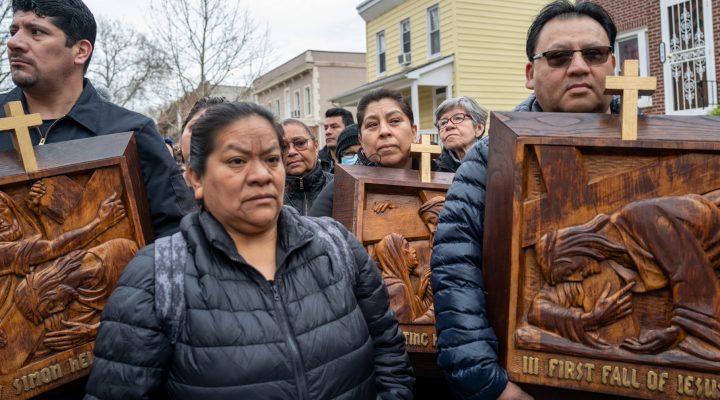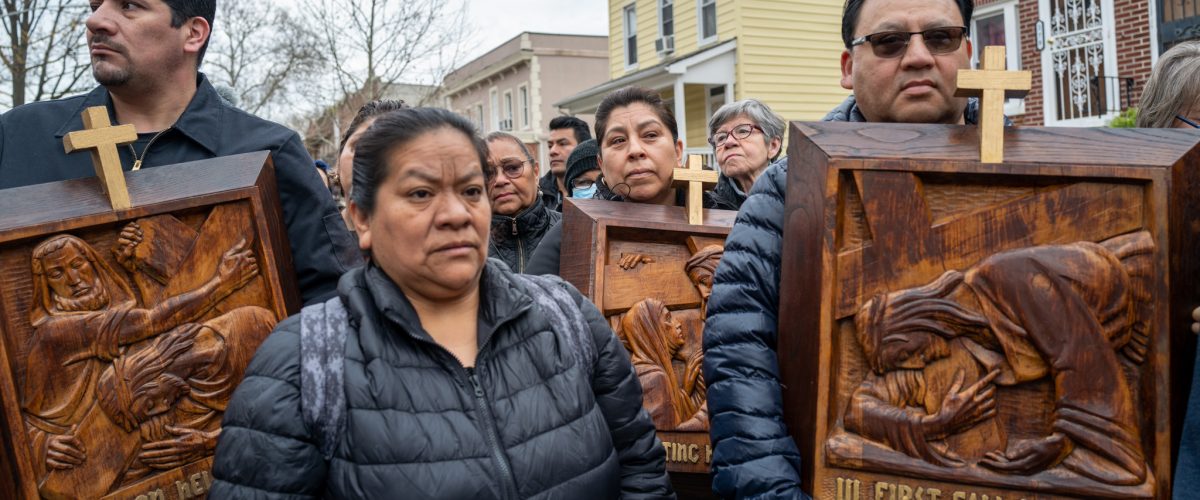Catholicism has taken the biggest hit from U.S. Latinos switching religious affiliations over the past decade or more, while the religiously unaffiliated have seen the most growth in that time frame, new research shows.
The Pew Research Center study also found the percentage of Latinos who identify as Protestants has remained largely stable in recent years, thanks mostly to those who say they are evangelical or born-again Christians.
“Catholicism has seen the greatest losses due to religious switching among Hispanics. Nearly a quarter of all U.S. Hispanics are former Catholics: While about two-thirds of Hispanic adults (65%) say they were raised Catholic, 43% say they are currently Catholic, according to the 2022 survey. And for every 23 Latinos who have left the Catholic Church, only one has converted to Catholicism.”
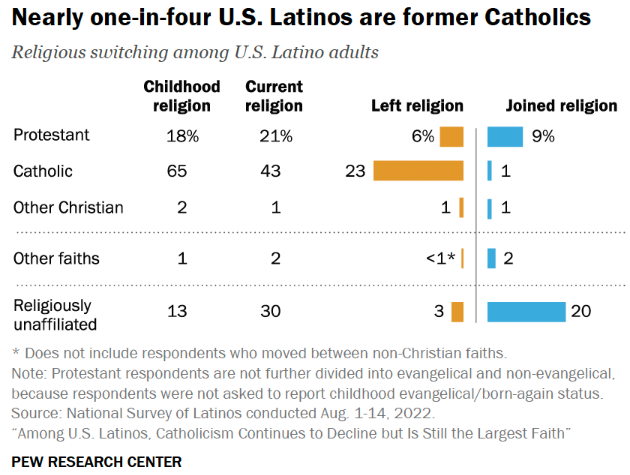
While the current percentage of those identifying as Catholic is down from the 67% measured in 2010, Latinos are still about two times more likely than other U.S. adults to claim Catholicism as their faith and are overall much less likely to be Protestant, Pew said in a survey summary published April 13.
By comparison, Latinos who say they are atheist, agnostic or “nothing in particular” has reached 30%, up from 18% in in 2013 and from 10% in 2010. The percentage of religiously unaffiliated Latinos roughly equals that of all U.S. adults.
“Fewer Latinos say they were raised with no religious affiliation (13%) than currently identify as unaffiliated (30%). For every Latino raised without a religious affiliation who has joined a religion in adulthood (totaling 3% of all Latino adults), about seven Latinos have left their childhood religion and become unaffiliated (20%),” the report explains.
The share of Latinos identifying as Protestants has seen limited increases, Pew researchers added. “Protestantism has seen more modest growth due to religious switching among Latinos. For every two Latinos who were raised as Protestants before converting to another faith or becoming unaffiliated, about three have converted to Protestantism in adulthood. In all, 18% of U.S. Latinos say they were raised Protestant, while 21% say they are currently Protestant.”
That moderate growth kept Protestantism firmly in second place behind Catholicism among U.S. Latinos. And since 2010, Pew said, “Hispanic Protestants consistently have been more likely to identify as evangelical or born again than to say they are not born again or evangelical.”
By 2022, 15% of Hispanic Protestants identified as evangelicals, who as a group have received much attention in American politics due to their support for Republican candidates, the Pew summary explained. “About three in 10 Hispanic Republicans (28%) identify as evangelical Protestants, a far higher share than the 10% of Hispanic Democrats who say the same.”
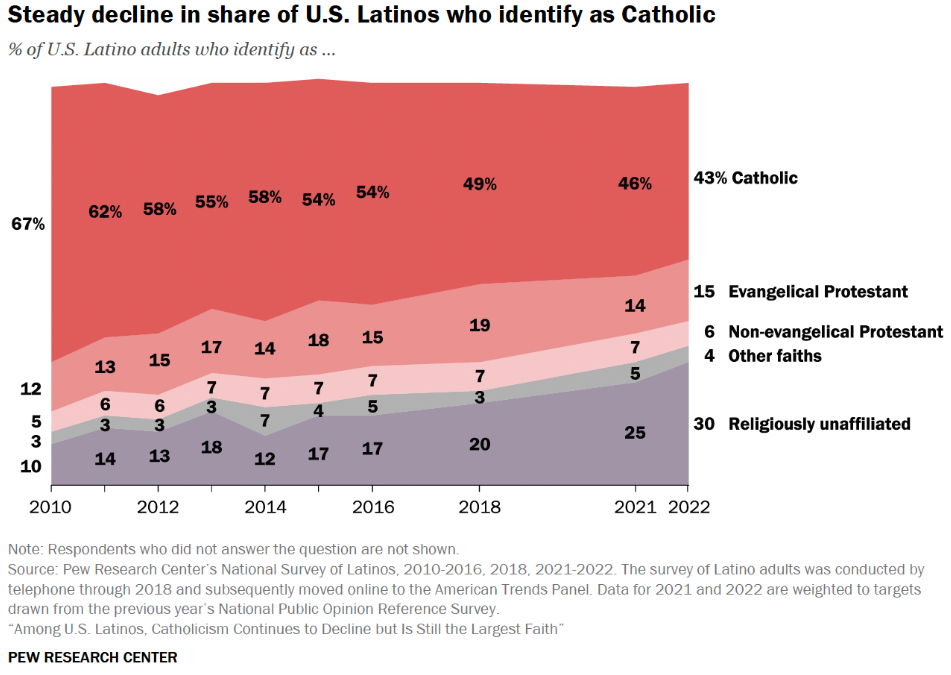
Pew also identified a connection between the ethnicity and generation of Hispanics and their religious and political leanings.
“Latino immigrants also are somewhat more likely than U.S.-born Latinos to be evangelical (19% vs. 12%). Evangelicalism is especially prevalent among Latinos with Central American origins, mirroring a pattern seen in those countries. Roughly three in 10 U.S. Latinos with Central American origins (31%) say they are evangelical Protestants, a higher share than among those with roots in Puerto Rico (15%) and Mexico (12%).”
Pentecostalism also is growing in influence among Hispanics in the U.S., Pew said. “Nearly half of U.S. Hispanic Protestant churchgoers (45%) say their services include praying in tongues at least sometimes. The share is even higher among Hispanic Protestants who describe themselves as evangelical or born-again Christians (57%). Attending services where people pray in tongues is much less common among churchgoing U.S. Protestants overall (27%).”
Nearly half of Hispanic Catholics who attend mass reported their services sometimes include praying in tongues.
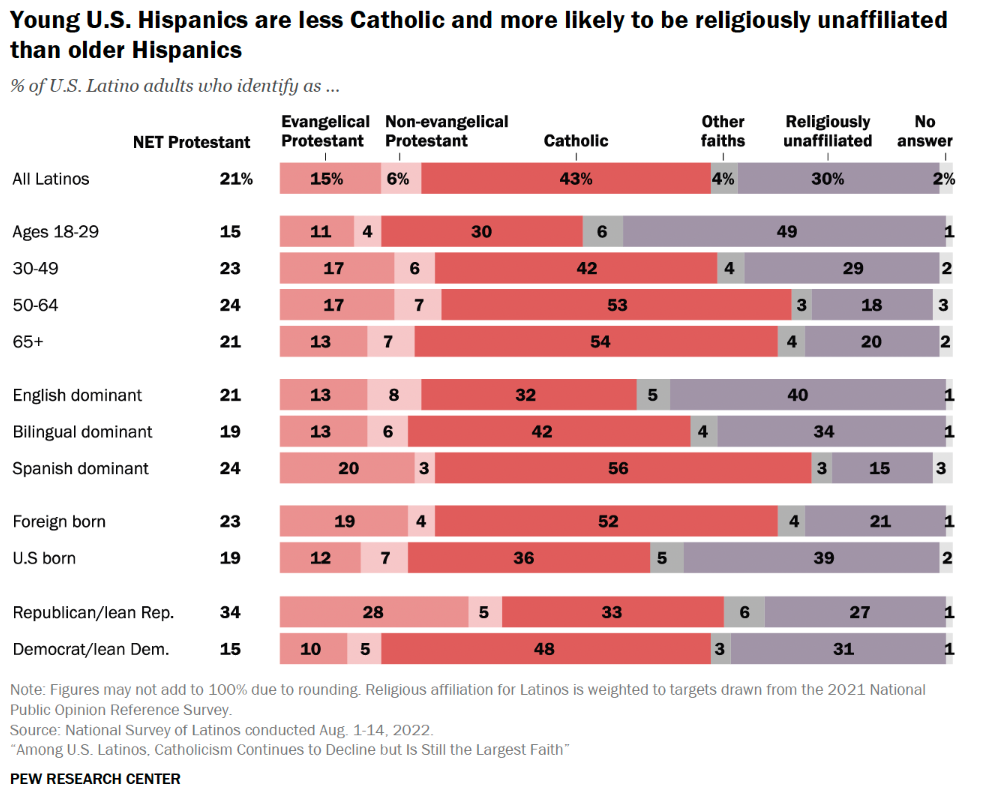
National origin and generational identity are significant contributors to the wider trends identified in the study, the Pew report explained.
“Young people born in the U.S. — not immigrants — have driven Latino population growth since the 2000s. Among U.S. Latinos ages 18 to 29, 79% were born in the United States. About half (49%) of Latinos in this age group now identify as religiously unaffiliated. By contrast, only about one in five Latinos ages 50 and older are unaffiliated; most of these older Latinos (56%) were born outside the U.S. Overall, 52% of Latino immigrants identify as Catholic and 21% are unaffiliated. U.S.-born Latinos are less likely to be Catholic (36%) and more likely to be unaffiliated (39%).”
U.S.-born Hispanics are partly behind the decrease in Catholic identity and in overall religious affiliation, Pew researchers said. “About one in five U.S.-born Hispanics (22%) were raised Catholic and no longer identify as Catholic; this is the case for 23% of foreign-born Hispanics. Disaffiliation from religion is somewhat more common among U.S.-born Hispanics: About a quarter of U.S.-born Hispanics (23%) say they were raised in a faith but are now religiously unaffiliated, compared with 16% of foreign-born Hispanics.”
The effect is similar among Protestants, the survey said. U.S.-born Hispanics are about as likely to become Protestants as to leave Protestantism (7% vs. 8%). But among foreign-born Hispanics, 4% were raised Protestant but have since left the religion, compared with 11% who were raised in another tradition (or no religion) and have since become Protestants.”
But whatever their affiliation, four in 10 Hispanic adults described their religious practice to be very important, according to Pew. “Protestants are especially likely to say religion is important to them and to report that they frequently pray and attend religious services. At the other end of the spectrum are the unaffiliated, sometimes called religious ‘nones,’ who are a relatively nonreligious group. Catholics fall somewhere in the middle.”
And like their white counterparts, Hispanic evangelicals were especially likely to demonstrate strong religious commitment, with 73% saying religion is very important in their lives. “Non-evangelical Protestant (56%) and Catholic (46%) Hispanics are somewhat less likely to say this. And about three-quarters of unaffiliated Hispanics say religion is not too or not at all important in their lives.”
Related articles:
Why so many Hispanics voted for Trump and other misunderstandings of America’s diversity

